Cultural Blindspots: How $40,000 Saved a $40 Million Market Entry Mistake
Executive Summary
This case study documents how a comprehensive user research study revealed critical cultural differences that prevented a costly international expansion mistake. An Australian gift card company's planned US market entry was fundamentally redesigned after research showed that feature prioritisation rankings between Australia and the US were completely inverted.
Bottom Line: A $40,000 research investment saved an estimated $40 million by revealing that the company's successful Australian product model would have failed in the US market due to fundamental cultural differences in gifting behaviors and values.
The Strategic Challenge
I was engaged by the executive group (CEO, CTO) of a successful Australian gift card company generating approximately $400 million in revenue annually. Having achieved market saturation within Australia, their strategic plan was to expand into the US market.
The existing plan was straightforward: copy and paste the entire business model—the tech stack, product features, and call centre support—and launch in the US to see how it would perform.
The Critical Question
During strategy meetings, I raised a fundamental question: "Does gifting behaviour change across different cultures?" In my view, gifting is an emergent quality specific to each society's social practices and will naturally vary worldwide. The CEO allocated resources for me to validate their expansion strategy by investigating how US consumers' gifting behaviours might differ from Australian patterns.
Research Methodology
The key approach was to break down the existing tech stack, product features, functionality, and user flows, then examine how users from different regions would respond to these elements. We included Australia, the US, and the UK in our study—the UK providing an important triangulation point to strengthen our comparative analysis.
Research Design
- Recruited 50 participants in each region (AUS, US, UK) - 153 total participants
- Participant screener: 'People who have been sent a digital gift card in the last 12 months'
- First-click analysis on preferred scenarios
- Deep-dive questions about gifting behaviours
- Feature prioritisation rankings
- Infinite segment analysis: regional comparison
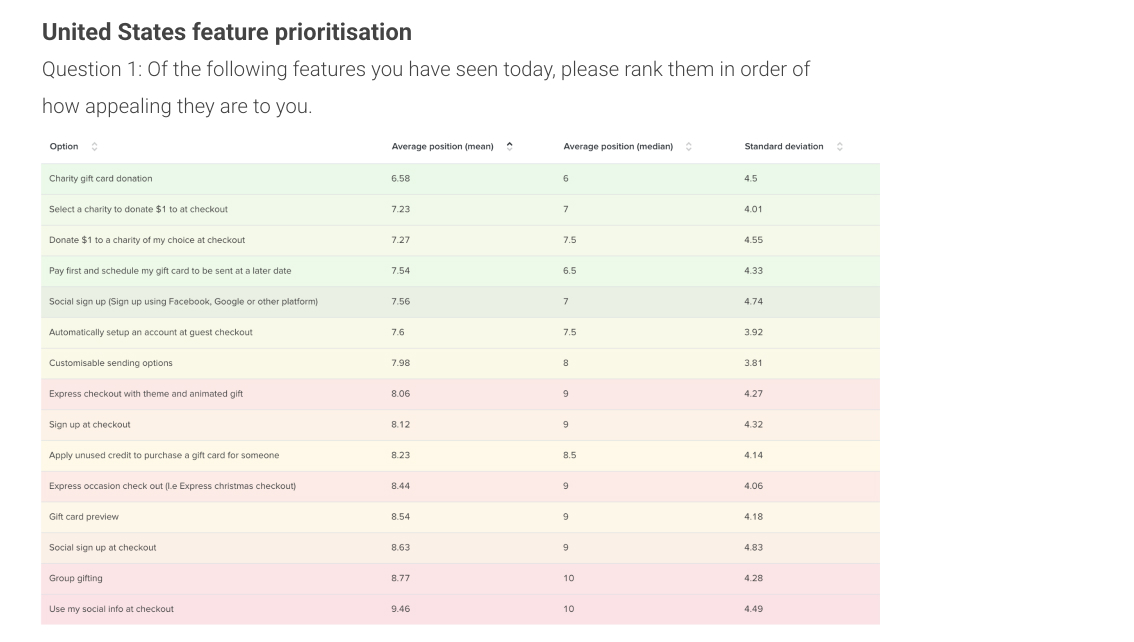
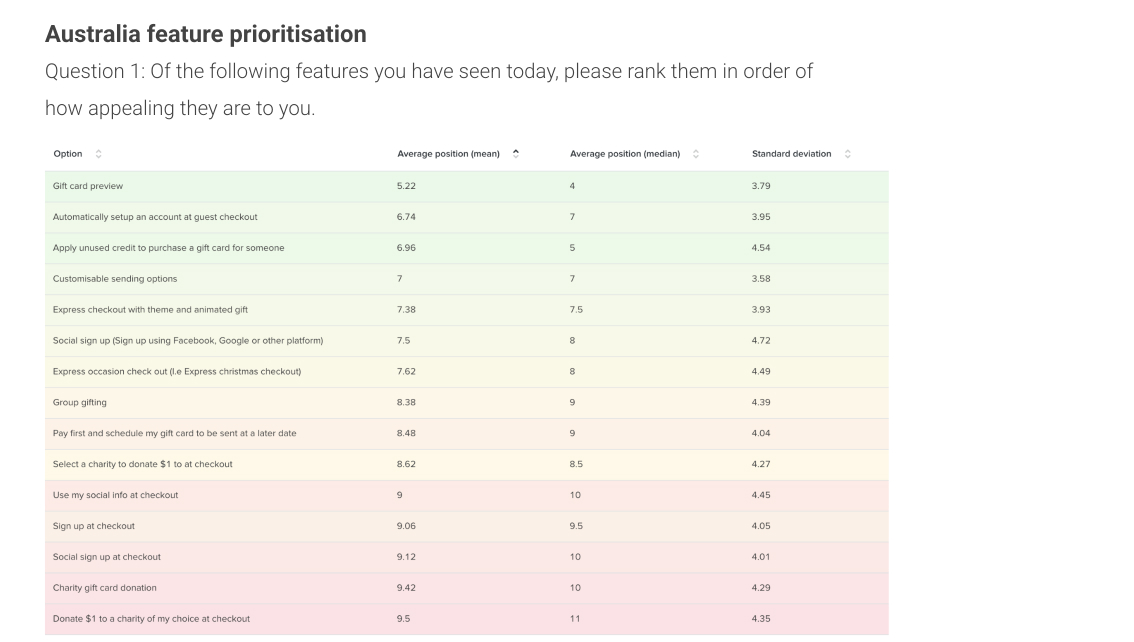
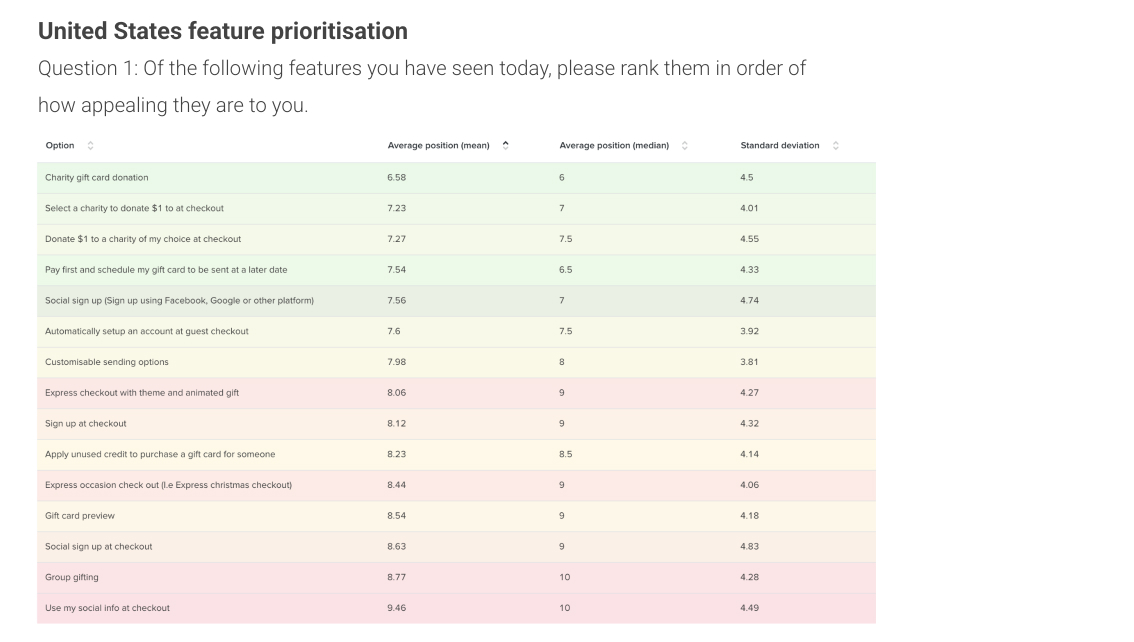
Our platform also tested future-state product features planned for the next one to two years—important since the US launch would take approximately two years to implement.
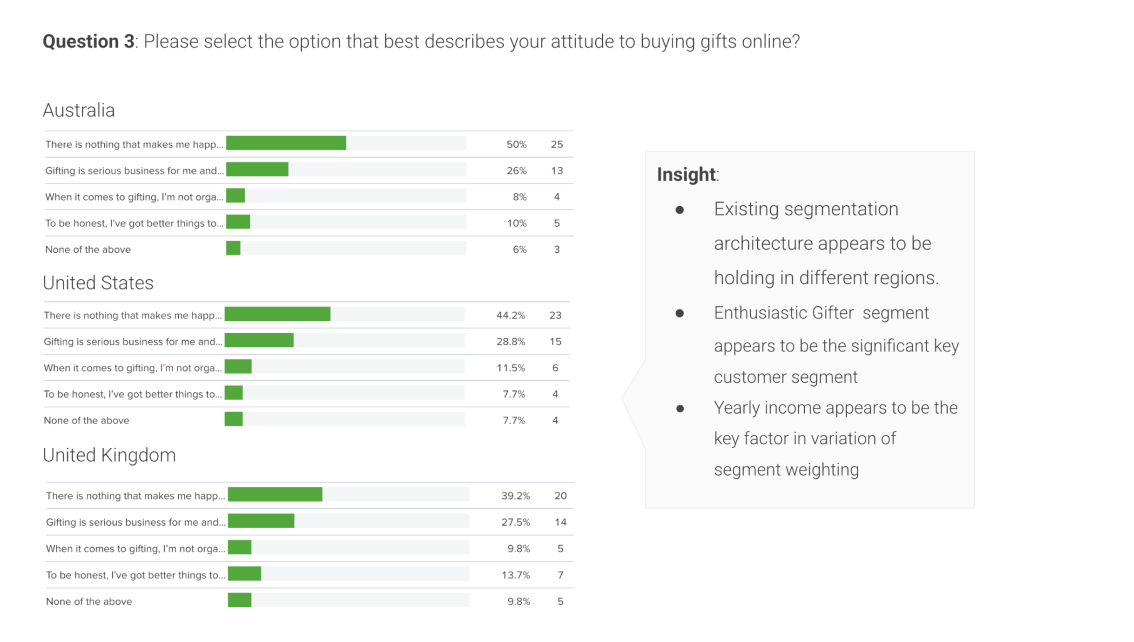
The Research Findings: Comprehensive Feature Analysis
The study successfully recruited 153 participants evenly distributed across Australia, United Kingdom and the United States, with an additional research survey conducted using a previous recruitment company to validate the quality of the new recruitment company (Optimal Workshop).
Key Finding: Significant Regional Variations
- UK and AUS markets are generally more similar, with the US features and general responses more unique
- The US market ranked 'Donations' at the top of the feature prioritisation
- The UK and AUS markets ranked 'Donations' at the bottom of the feature list
- Existing segmentation architecture is holding equally across US, AUS and UK markets
- The majority of users in the majority of scenarios found the concepts desirable
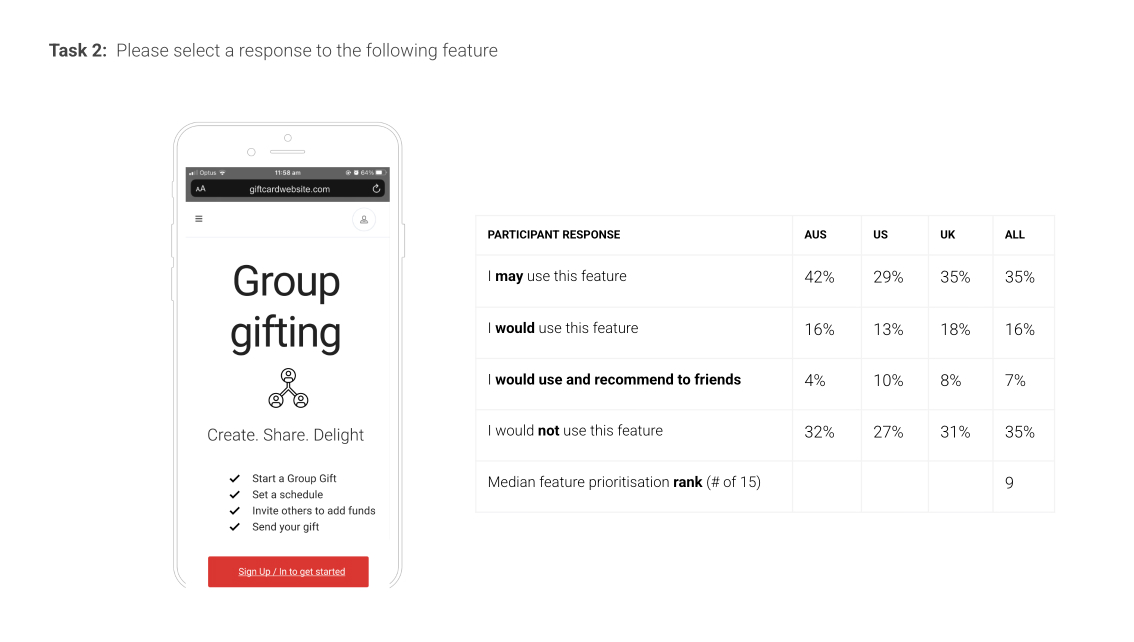
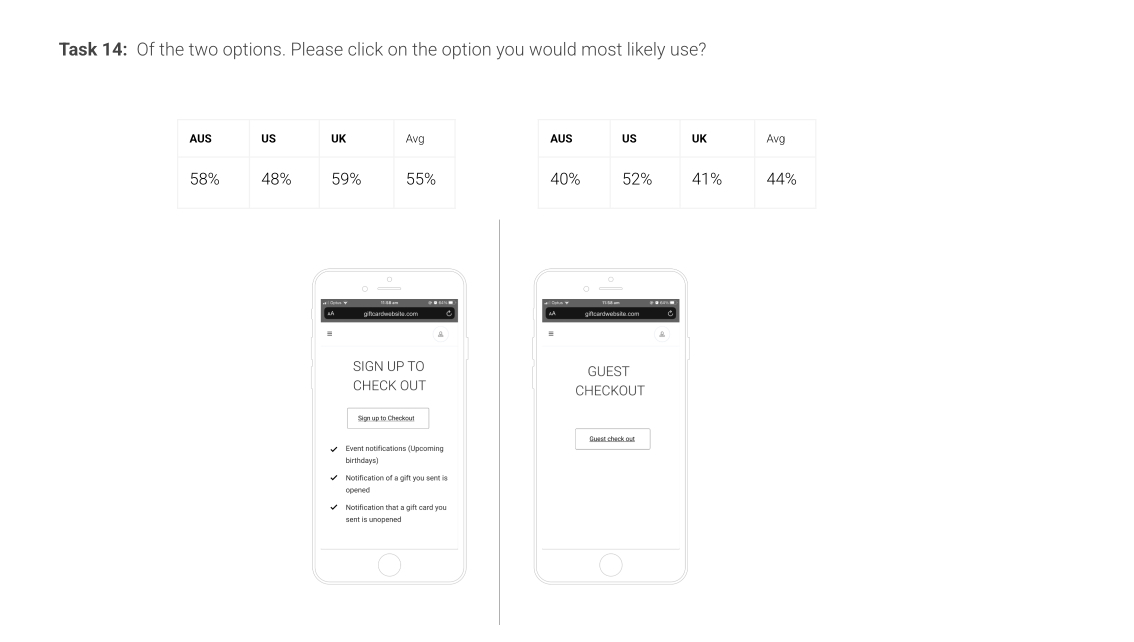
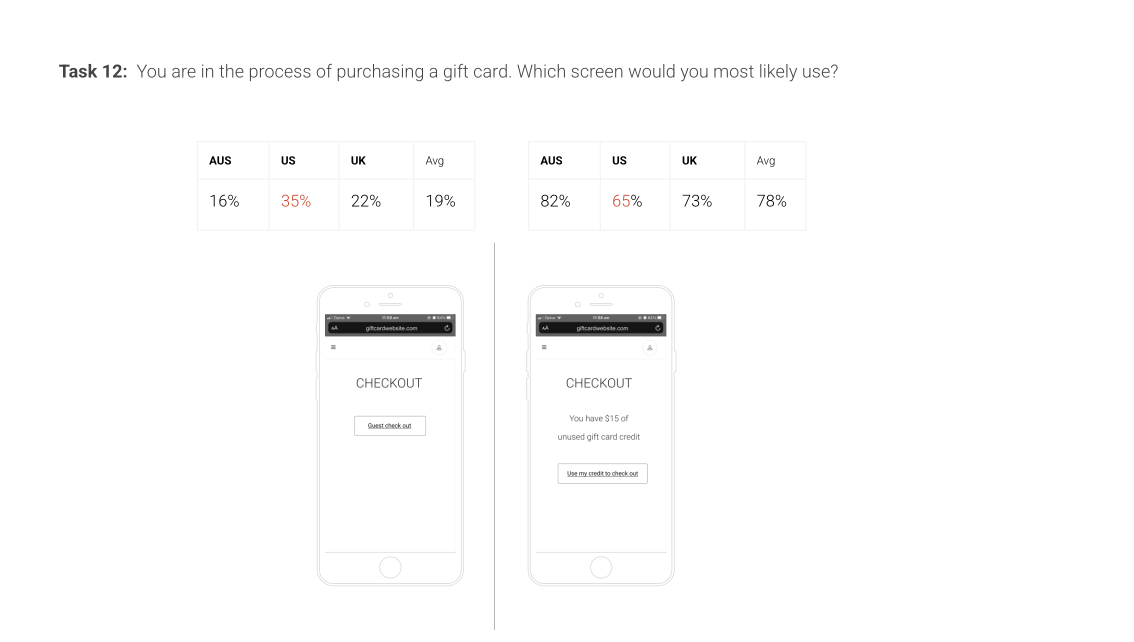
The Most Striking Discovery
"The most striking discovery was that product feature prioritisation rankings between Australia and the US were completely inverted"
United States Feature Prioritisation (Top 5)
- Charity gift card donation (6.58 average position)
- Select a charity to donate $1 to at checkout (7.23 average position)
- Donate $1 to a charity of my choice at checkout (7.27 average position)
- Pay first and schedule my gift card to be sent at a later date (7.54 average position)
- Social sign up (7.56 average position)
Australia Feature Prioritisation (Top 5)
- Gift card preview (5.22 average position)
- Automatically setup an account at guest checkout (6.74 average position)
- Apply unused credit to purchase a gift card for someone (6.96 average position)
- Customisable sending options (7.0 average position)
- Express checkout with theme and animated gift (7.38 average position)
Australia's Bottom Features
- Charity gift card donation (9.42 average position)
- Donate $1 to a charity of my choice at checkout (9.5 average position)
Fascinating Results
Australian Users: Experience-Centered Approach
Australian users strongly valued understanding and empathising with the gift recipient's experience—they wanted to see when a person received their gift, call them afterward, and customise the gift-opening experience. This reflected an empathy-centered approach to gifting where the giver feels good because the recipient feels good.
US Users: Values-Driven Approach
In contrast, US users prioritised completely different features: donations and gift card contributions to charities. This might be connected to different religious beliefs in the US market, where charitable giving as part of gifting carried greater significance than the unwrapping experience.
Universal Patterns Across Markets
- Gift preview was clearly the most desirable feature in AUS and UK markets
- Social sign up/in, customisable sending options and express check out ranked in the top 5 globally
- The majority of users would prefer to pay first, then send the gift
- The majority of users indicated they are more likely to use Social Sign up vs manual field based sign up
- Almost 80% of users would like to use existing credit when purchasing a gift card
Payment Preferences
Global average prioritisation:
- PayPal (5.73 average position)
- Credit card (6.52 average position)
- Pay with unused gift card credit (7.53 average position)
- Direct Credit and/or Bank Transfer (7.52 average position)
Account Creation & Checkout Behaviours
- Christmas express check out was the preferred check out experience compared to the current state
- Express Christmas and express checkout are the recommended solution
- Users like a faster check out using social sign in, however they are cautious of social info being used
- Automatic account creation at checkout is desirable: 30% indicated they would use this feature, with 39% indicated they 'may'. Only 18% indicated they would not
Strategic Impact
This research uncovered ethnographic, sociological, and anthropological insights that are almost always missing in the tech industry. We frequently don't understand how beliefs, behaviours, and social practices vary across markets, regions, and countries.
Companies tend to project their own cultural assumptions onto new regions without recognising these crucial differences.
This case demonstrates why validating strategies before significant investment is essential—particularly when expanding internationally.
Using This Approach
Using this approach and methodology, as designers we can iterate weekly without any code or product changes, and understand which pathway to take that maximises product success potential.
Cultural Validation
- Never assume universal appeal of successful domestic features
- Invest in cultural research before major market investments
- Test core assumptions about user behaviour across target markets
- Develop region-specific product strategies based on cultural insights
Implementation Strategy
- US Market: Lead with charitable giving features as core value proposition
- Australia/UK Markets: Focus on gift preview, customisation, and practical features
- Avoid copy-paste approaches - develop culturally-adapted product experiences
The $40,000 research investment prevented a potential $40 million mistake by revealing fundamental cultural differences that would have caused the Australian product model to fail in the US market. This case study provides a framework for cultural validation that can prevent costly international expansion errors while enabling more effective, culturally-informed product development strategies.
